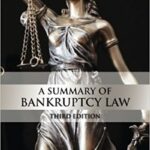
Trouble shared is trouble halved.
Brainy Quotes attributes that bit of wisdom to writer Dorothy Sayers. (Also to Lee Iacocca; take your pick).
One of the things that keeps me troubled at night is the preclusive effect of a filed proof of claim.
So, I’ll share my worries, and you can worry too.
Filed claims deemed allowed
Bankruptcy Code 502(a) is the source of the trouble:
(a)A claim or interest, proof of which is filed under section 501 of this title, is deemed allowed, unless a party in interest, including a creditor of a general partner in a partnership that is a debtor in a case under chapter 7 of this title, objects.
Nothing obviously troubling there until you read and consider the case of Siegel. This 9th Circuit case is more than 20 years old and the issue is remarkably fresh: a dispute with a mortgage lender.
Siegel and a partner borrowed money to buy a couple of apartment buildings. They subsequently defaulted and Siegel filed Chapter 7. Freddie Mac, who then held the note, filed a proof of claim in the no-asset Chapter 7. Not surprisingly, no one objected to the filed claim.
The absence of an objection wasn’t significant until Siegel returned to the fray, post discharge, and sued Freddie Mac in state court alleging that Freddie Mac violated its duties under the note. Freddie Mac responded with a motion for summary judgment, contending that the issue was res judicata because of the unchallenged proof of claim in the no asset Chapter 7.
And the Court of Appeals agreed.
…allowance or disallowance of a claim in bankruptcy is binding and conclusive on all parties or their privies, and being in the nature of a final judgment, furnishes a basis for a plea of res judicata. 143 F.3d 525, 529.
What bankruptcy lawyers know
In the real world, bankruptcy lawyers know that there is no reason for anyone to review or assess claims filed in a no asset bankruptcy case. While the 341 meeting notice may suggest that creditors not file claims where no dividend is expected, if a claim is presented to the clerk’s office, it will be filed.
The opportunities for mischief abound. Sneaky creditors can establish their claims for all time by filing a proof of claim that no one will read.
And I can just hear the colloquy with bench should I object to a claim in a no asset case. “What’s your point, Ms. Moran?”
Just what has been adjudicated
That is the heart of what worries me about Siegel and similar cases: just what has been adjudicated?
[A]”claim could have been asserted at the time of the proceeding confirming sale [in bankruptcy] . . . this opportunity is sufficient to satisfy [the] requirements of the doctrine of res judicata.”
That’s pretty broad and could effectively bar any challenge to any legal issues existing as of the filing. The lender here got a pass on all of its prepetition actions by virtue of filing a claim in a no asset case.
Siegel went on to allow Freddie Mac its attorney’s fees in the post bankruptcy litigation under the provisions of the pre petition contract between the parties or their predecessors. So, the contract lived on and presumably the duties of the parties to the contract to each other.
No presumption of validity for post petition lender claims
By contrast to § 502, Bankruptcy Rule 3002.1 explicitly denies the presumption to lender claims arising post petition. Rule 3002.1(d) and (g).
Remember that Rule 3002.1 applies only in Chapter 13 and only to debts secured by the debtor’s principal residence. So, the scope of worry is narrowed only slightly.
Worried yet?
In the absence of contrary circuit authority, the charge to debtor’s lawyers seems clear and enormous: permitting the allowance of a filed proof of claim in a bankruptcy case waives all challenges to the claim that then exist.
Does this preclude a challenge to mortgage accounting? For just this servicer? or for all prior servicers?
Does this require a discrete disclosure to the client of the issue and a waiver of any duty on the part of debtor’s counsel to examine the claim and the history behind it? Can you ethically bow out of such review? Does your representation agreement bind you to do so? For what price?
Sweet dreams…..








My colleague Wayne Silver dug out an Internal Revenue Bulletin 2006-14 which says the IRS won’t argue the res judicata effect of a file proof of claim, where the claim was not actually litigated. So, small mercies are available.